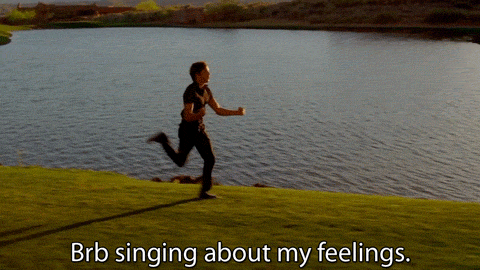My question wasn't whether you can poetically define the word reality though. My question was whether if the proposition, "I see a tree in front of me," coincides with an actual tree in the external world or not. Is there an actual tree I'm perceiving with my eyes or is the result of electrical impulses fed into my brain by a super computer? As I explained in my previous example, someone experiencing a phantom-limb may perceive that there is an arm there and may claim, "I'm moving my arm around," but that claim is obviously not true. So why won't you try to answer my question seriously.
This was actually in reply to Polboron. I just copy pasted my post at a number of points and for whatever reason I guess the quote didn't come along with it. If you haven't looked into the signal transduction pathways involved in sight yet, then you definitely should. It's pretty cool. You only need a single photon to hit the rhodopsin in your rods to set off the whole thing.
Why not? Are you saying that it isn't absurd to propose that the hand you put in front of your face is actually not real (G.E. Moore 1939) or that basic mathematical axioms (such 1+1=2) may be false?
I think it is absurd to say that there is nothing real behind the perception of the hand in front of your face. That is not to say that your perception is spot on. Verification by other parties helps alleviate this concern to a certain extent.
There comes a point when an idealistic sense of reality becomes terribly inconvenient, and as such I am all for replacing it. In any case, it is a pain to keep on quoting, so I'm going to start using quotation marks instead. Anyhow, this is irrelevant, but you can actually do things like redefine addition such that (for example) x+y=x+y+1 (That is, when you "add" any two numbers, you add those numbers and one). However, all you are really doing is changing the operation of addition. 1+1=3 and 1+1=2 have different meanings (though when it comes down to it, they're kind of saying the same thing). Please note that this isn't actually a counterpoint but a random side note. I think it is absurd to suggest that 1+1=2 is false. May as well get it over with and argue that x≠x, and in that case you better be willing to throw out any argument you attempt to make using even the most basic of logic. That delves into pointless absurdities.
"There aren't 2 contradictory perceptions, there is only one."
Your eyes see a stump. Your brain, due to problems associated with divvying up the neurons, does not. These are both things you perceive. What your eyes see in this case just happens to jive with reality. You don't have an arm. As mentioned, you can also get verification of this from other parties. That being said, you could make the claim (and I would accept it if you did) that these two perceptions are not actually contradictory since it is like comparing apples and oranges.
"The one who is perceiving the arm to be there isn't assuming the arm to be there as if he was wondering to himself "hmm I feel an arm there but there might not be one" rather he found no reason to question it."
I wasn't approaching this from the standpoint of fact, rather from the standpoint of logical possibilities. Just because something is "true" does not make it "fact". The key here is actually in what you said... "true statement in reality"... In other words, I never actually addressed your question at all. Rather, I just phrased my argument to make it sound as if I did.

I also shamelessly used fact and truth interchangeably throughout my post. I have also broadened the definition of perception considerably, as I'm sure you have already noticed. Anyhow, what's funny about phantom limb is that the people suffering from it often talk about it as if it's still there even though they know on some level it's not... So it's fun to trick 'em! Maybe convince them they're walking the dog, when they're not even holding the leash. Or maybe... have you ever tried blowing their phantom limb off with a bazooka?

On a more serious note, I've always found it pretty cool that the mirror box actually works. I'd like to take some courses on neurology and evolutionary psychology in the future, but I really don't have the time at the moment.
"...but to suggest it's pointless to demonstrate facts we are sure to be certain about."
The skeptic argument essentially trivializes itself.
"I'll give you a possible start one may use against the brain in a vat hypothesis: with modern understandings of the brain and how it incorporates information, can a super computer really do that? (If it is so easy, why don't you make one)"
I thought I already mentioned somewhere that the notion is practically unfeasible (though that may have been in an earlier version of my post)? In any case, I never said it was easy. I said it was a convenient hypothetical example since you can kind of explain away perceptions of the world around you. Because of this, it would be a perfect choice to illustrate the point I suspect you are trying to make.
"I see, so if I actually believe that the 2012 apocalypse is going to happen then that is the reality for me."
Well, no. Don't forget that I am you too, and I don't believe that the 2012 apocalypse is going to happen. The "you" that believes in the 2012 apocalypse is merely a fragment of Yourself. If the 2012 apocalypse occurs, it is because You make it so. What a single fragment thinks doesn't play much of a major role. We are not fully aware of You because You is on a higher plane of consciousness. Likewise, You is not fully aware of us. And.... I'm going to stop myself there.

"So why won't you try to answer my question seriously."
If I answered your question too seriously (judging by what you've said so far anyway), then we'd probably agree on most points. The conversation would stagnate far too quickly, and thought would be discouraged. Introducing lots of silliness and a bit of controversy allows the conversation to go a bit further, and allows you to think about the question in ways you might not otherwise if answering too seriously. This is the kind of thing to think about on a number of different levels, as an intellectual sure, but also just as a person. Also, just because I'm not a very serious person, don't assume I'm not being serious and putting my heart into this in my own way.
"I mean yeah you can just remain indifferent and enjoy life."
It's not necessarily that I'm indifferent. It's more that I feel it is a better use of my time to explore within the confines of one system as opposed to dropping everything each time somebody comes up with another cock and bull story. I'd rather talk with my professor about the shmoo in yeast than to consider whether or not yeast are actually a relic of the super soldiers developed in an alternate universe during WWII. This doesn't mean that I won't consider it, but I do have certain priorities. When I say it doesn't matter at all, I'm exaggerating.
"I wanted to get responses from people who are new to field to make good guesses of how we may actually know we are brains in a vat."
Honestly, I feel this brain in a vat question could have almost been given it's own topic in general discussion for more people to discuss ad nauseam. I'm not so sure that the fact this particular question is in "forum games" helps. If it makes you feel any better, then I can't speak for others but I've enjoyed this question and have approached it in a way I certainly haven't before. Also, I'd like to take this moment to apologize for the statement about philosophy being 2% logic, 90% word games. It was a joke, and in perhaps poor taste. That being said, there are those that call themselves philosophers that treat philosophy just like that. Really, philosophy is what you make of it, as with anything else. In actuality, I have a lot of respect for the field. Science is much better off for it. Now how many philosophers does it take to screw in a lightbulb?

"If I take a bazooka and blow my enemy's arm off, no one has to assume anything about the fact that he lost his arm."
Why is it that this particular question has resulted in assumptions being beaten up, arms being blown off, the apocalypse, and the devil randomly tricking people? Anyhow... you don't have to assume anything since you are essentially stating "I blew off my enemy's arm with a bazooka". Rather, this is a necessary assumption to say anything at all. You have to assume X in order to say X=X, but this is a such a trivial assumption that we might as well ignore it. As you point out, we have no reason whatsoever to question it. Though back to bazookas, if you replace bazooka with water pistol then such a statement might raise a few eyebrows. There may be reason to question such a statement at this point. How would you blow off an arm with naught but a water pistol? I think I was going to make a point here, but I forgot what it was. Doesn't really matter though. The real question here becomes whether or not there is good enough reason to question the assumptions. Given that we're talking about truth
in reality, I'd say it is pretty fair to say the answer is no. We could say yes, but as you said that opens up a whole can of worms, and I think both of us would rather not go there. As is, we both accept that the phantom limb is not actually there. There is a line, that when crossed leads to ugliness, vagueness, and a whole bunch of other things. It can be fun to cross at times, annoying at others... I have a migraine though, so it's a no go.
"So evidence of the proposition of whether your girlfriend actually cheated on you or not doesn't matter as long as you assume it to be true?"
What I meant is that you adopt a certain framework to examine the evidence, and it is the framework you choose that is important when both result in logically valid statements. It was a poor choice of words, but I was really tired. On a related note, how dare she!

"unless you're saying that modern scientific endeavors are not necessarily more valid than Aristotle's picture of the world."
Well, I haven't read much of what Aristotle actually said so I can't say how logically valid what he said was. However, modern scientific endeavors clearly have a much closer adherence to reality. Thanks to a groundwork laid by philosophers and scientists and advances in technology, science has blah blah, too tired to complete my thought. In any case, I'm sure you have at least some idea of where I was going with that so...
"
Anyways after one or more replies by tomorrow, I'll be posting up my answer to this and a new question."In that case, I guess I'll get to see where you've gone with this after posting.I'd like to finish off by saying that I'm sorry if I've offended or upset you in any way. I'm an extremely silly person who doesn't mean more than half what he actually says, but I'm aware that this can come off as kind of obnoxious on the internet. I've enjoyed this conversation. I'm sorry that I don't really have much else to contribute so we could discuss this further.

 Sign In
Sign In Create Account
Create Account





 Back to top
Back to top













